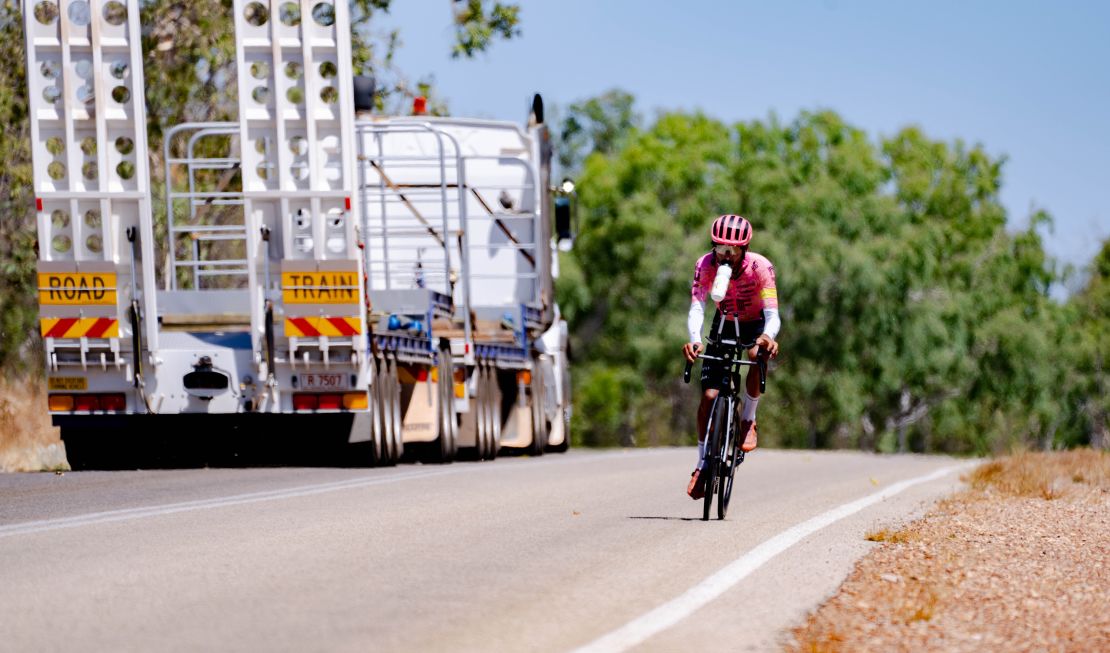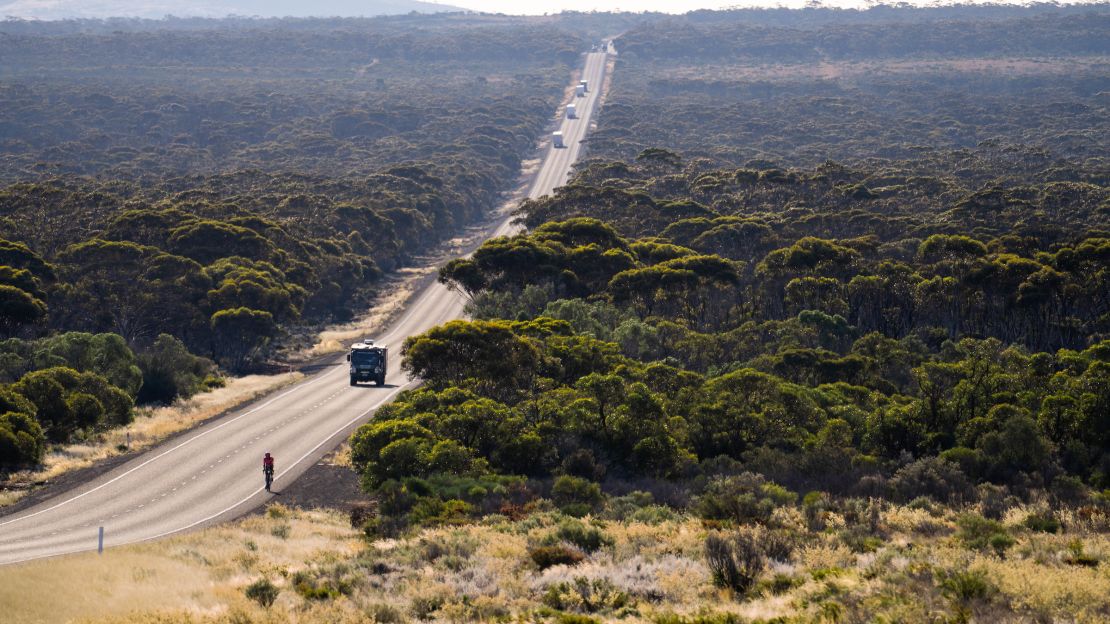“It feels like a lifetime I’ve been out here,” says Lachlan Morton, his body fatigued to the extreme from hour upon hour of pedaling on Australian tarmac, following roads that stretch as far as the eye can see.
In reality, it took 30 days, nine hours and 59 minutes for Morton to complete a full lap – just over 8,800 miles or 14,200 kilometers – of his vast country in record time, arriving back in his hometown of Port Macquarie on Saturday. But you can forgive him for thinking that it’s been longer.
During his travels, the professional cyclist braved brutal headwinds, extreme temperatures, dangerous traffic and even dusted himself off after a run-in with a kangaroo. That’s all while cycling an average of 450km a day, spending up to 17 or 18 hours on a bike daily, stopping only to sleep, eat and mentally reset before doing it all again.
“You might finish a day and you have a huge sense of accomplishment, of relief, and then you’re asleep within 20 minutes,” Morton told CNN Sport earlier this week as he neared the end of his adventure. “And then before you know it, you’ve woken up and you’re back to zero. It’s tough.”
Come Saturday, it all seemed worth it. Morton easily broke the record for the fastest lap of Australia – beating David Alley’s time of 37 days, 20 hours and 45 minutes set in 2011 – when he rolled back into Port Macquarie, which is a four-hour, 15-minute drive north of Sydney.
It signaled the end of an immense feat of endurance and perseverance, one that has involved mastering – or enduring – the full spectrum of Australia’s unforgiving weather.
“Rainy days, big, long headwind days – I think mentally they’re probably the most challenging,” says Morton. “You’re going to spend 17 or 18 hours just pedalling in one direction straight into the wind, which is quite maddening, to be honest.
“It’s very loud. You can very quickly convince yourself that it’s someone working against you, like it’s like some sort of plot against you. Reminding yourself that you’re just on a bike ride becomes very important.”
This, however, was far from any normal bike ride. At times, Morton would begin his day in the saddle at midnight having gone to bed at 5 p.m the night before. The early starts were intended to beat the intense heat in northern Australia, while also avoiding the heavy trucks roaring past his two small wheels. He found that his lights cut through better at night, making him more visible to the traffic.

“Trying to complete the route and also not get run over, it’s been a challenge in itself, for sure,” Morton says with only a hint of a joke.
Even with the early starts, sleep – at least six hours of it a night – has been a priority, and the 32-year-old’s crew, which includes his childhood coach, a masseuse, a bike mechanic, and his wife Rachel, have been a source of constant support.
According to the Road Record Association of Australia, a successful lap of the country must be 14,200 kilometers or longer and pass through at least six of the following towns and cities: Adelaide, Brisbane, Broome, Darwin, Esperance, Melbourne, Perth, and Sydney.
Pain and discomfort is inescapable with a challenge like this. Morton admits that walking is a struggle first thing in the morning, so too the initial couple of hours on the bike. But after that, he says that his body has generally felt “pretty good”; it’s the mental toll of being alone on a bike all day that has tested his resolve more than anything.
“It can be very monotonous,” says Morton. “The mind games and tricks you kind of have to play on yourself become a lot more intense, and it’s a challenge in that you could be peddling essentially straight in one direction for 16 hours, just thinking of different ways to make it go by quicker or to make it more enjoyable, which is tough.”
Morton is a unique breed of cyclist, a rider who has competed in some of the sport’s biggest road races – the Giro d’Italia and the Vuelta a España – while also forging his own path in endurance cycling.
In 2021, he rode what is known as the Alt Tour, completing every stage of the Tour de France under his own steam and arriving in Paris five days before the main peloton.
A year later, he rode from Munich to the Polish-Ukrainian border in a single, 42-hour push to raise more than $250,000 for Ukrainian refugees.
But the cycle around Australia has been a different beast altogether, purely based on the sheer size of the country, much of which is remote and uninhabited.
“Just getting a feel for how huge it all is, it’s pretty mind-blowing,” says Morton.
On top of colliding with a kangaroo – “I nearly went over the handlebars – it was a very close call” – Morton has encountered snakes on the Nullabor Plain and experienced the beauty of birdsong at sunrise and sunset – “probably the most special time to be at the bike.”
All the while, he has wrestled with the same issues as any endurance athlete. When it comes to fueling, Morton says that there is no strategy or science behind his approach beyond what he’s craving at any given time. That might be sandwiches, meat, eggs, rice, muffins and cookies – “basically regular food” – all washed down with around six cups of coffee a day.
“Certain days, I would eat up to half as much as other days, just based on the way I’m feeling,” he says. “When I’m hungry, it’s wild how much food I can put away.”

Throughout the challenge, Morton has been supported by his EF Education–EasyPost team, which has been chronicling all the twists of turns of his two-wheeled odyssey on social media. As of Sunday, he had raised more than 130,000 Australian dollars (around $90,000) for the Indigenous Literacy Foundation, providing books and resources for Indigenous children in remote Australian communities.
Riding several hundred miles every day for a month feels like just the latest chapter for a cyclist eager to push the boundaries of his sport and explore life beyond a tightly-packed peloton. For Morton, cycling is adventure – a way to strike out on his own and see the world in a new light.
“The different experiences you can have just using bikes are pretty remarkable,” he says. “I don’t value any more above the other. It’s just been a journey, you know?”





